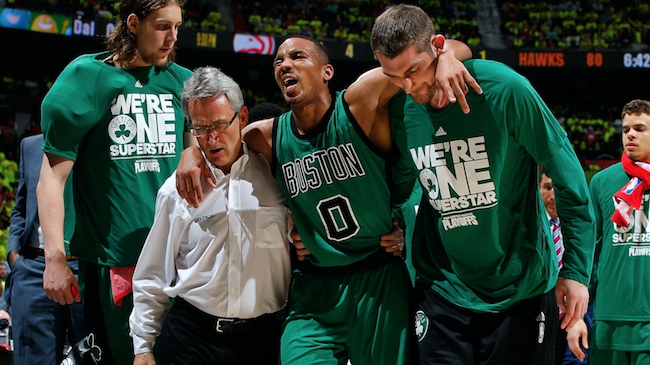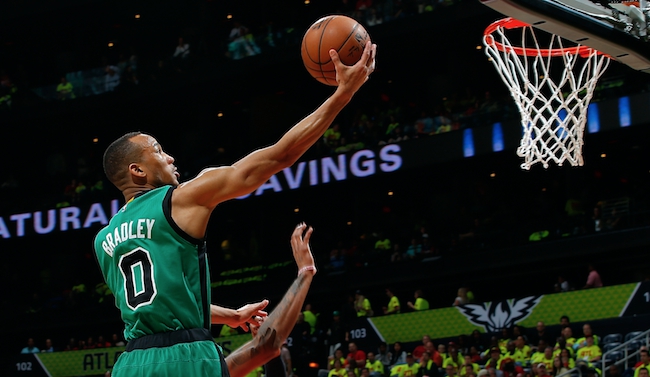
Avery Bradley isn’t a star.
The Boston Celtics guard managed the solid but unspectacular stat line of 15.2 points, 2.1 assists, and 1.5 steals per game during the regular season. He’s closer to a streaky three-point shooter than a true marksman, regressed from mid-range in 2015-16 compared to years past, and doesn’t quite have an argument as basketball’s premier perimeter defender despite his burgeoning reputation.
Bradley, obviously, has holes in his game. Not even the biggest Celtics homer would suggest otherwise. What should be even more clear to the basketball world, though, is the sixth-year veteran’s immense importance to his team on both ends of the floor – a sad reality for Boston considering he’s likely to miss a portion of the playoffs at the very least.
Midway through the fourth quarter of the Celtics’ tooth-and-nail 102-101 loss to the Atlanta Hawks in Game 1 of the team’s first-round playoff series Saturday night, Bradley pulled up limp and went down in a heap on the Philips Arena floor. The worst fears of a head injury were erased moments later when he reached for the back of his right leg and was helped to his feet by teammates. Room for optimism remained even after the Celtics announced he wouldn’t return to the game due to a strained hamstring.
Unfortunately, hope for Bradley’s Game 2 availability all but vanished entirely after Brad Stevens and his players spoke with reporters following the Celtics’ loss.
Brad Stevens on Avery Bradley: "No update. I saw Avery. He’s very, very sore. He said on the court that he heard a pop."
— Boston Celtics (@celtics) April 17, 2016
Marcus Smart: "we're going to miss Avery," as if they don't expect him to play…#celticsvshawks #NBAPlayoffs
— Matt Winer (@MattWinerTV) April 17, 2016
Yikes.
Boston can’t beat Atlanta without Bradley. That may seem like hyperbole considering the player in question makes his biggest mark defensively and isn’t tasked with stopping an opposing superstar. But the Celtics’ structural limitations combined with the Hawks’ defensive scheme magnify Bradley’s worth to his team even more than normal.
Case in point: Jeff Teague running roughshod over Boston down the stretch of Saturday’s game.
Atlanta’s point guard was good from the opening tip in Game 1; he finished with 23 points and 12 assists on 7-of-15 shooting with just two turnovers. Still, Teague did by far his most impactful damage with Bradley in the locker room, scoring seven points and dishing two assists over the game’s final six and-a-half minutes. An especially scintillating stretch that included an awkward driving layup and a pair of fancy dishes gave the Hawks a lead they’d never relinquish.
Boston has no one to blame individually for Teague’s play in crunch time. The Celtics elected to switch all perimeter screens with Bradley sidelined, a strategy that reared its ugly head when Teague blew past Jae Crowder to finish at the rim and break a tie. They had trouble locating him in transition before he found Al Horford and Paul Millsap for easy finishes, too.
Unless Stevens sticks Marcus Smart on Teague, there’s just no one on Boston’s roster capable of locking Atlanta’s speedy floor general – who inspired “Playoff Teague” tweets through Saturday’s action, by the way – down like this.
https://i.giphy.com/Xp40jMiTZ6IBq.gif
Boston’s best chance to stymie the Hawks was always going to be playing Bradley and Smart simultaneously. Isaiah Thomas gets swallowed by picks on the ball and just isn’t long enough to effectively contest Kyle Korver’s release. Evan Turner is too big to check guards comfortable making plays off the bounce and too big to slither through screens off the ball. Terry Rozier and RJ Hunter are rookies, largely untested during the regular season and bold question marks when it comes to playoff preparedness.
Just where does Boston go from here?
That’s unclear. Thomas and Smart can’t play 48 minutes every night, and the Celtics’ most effective offense in Game 1 came with Crowder sliding down to play small-ball power forward. There’s just not enough shooting on the floor with a normal perimeter triumvirate of Thomas, Smart, and Turner, either, an inherent flaw of Boston’s that Bradley abates more than any of his teammates.
He’s not a knockdown shooter by any stretch of the imagination, but can make triples off the bounce or on the move and has an advanced pull-up game from 20 feet and in. The latter skill is especially important against Atlanta, which dares pick-and-roll creators into launching long twos when they aren’t blitzing the ball. Bradley, for instance, took six two-pointers outside the paint in Game 1 and connected on four of them.

The Celtics, as you’ve no doubt heard by now, lack established shot manufacturers outside of Thomas. Bradley is their next best thing to a viable secondary creator at all levels of the floor. In addition to his finite yet influential ability as a shooter, he’s an awesome finisher when he gets all the way to the rim and an elite runner in the open floor.
Is forcing Smart out of his comfort zone the best way to account for that loss of production? Is allowing Turner more freedom a possible route to efficient offense? Are Hunter and Rozier ready for meaningful postseason minutes?
Boston’s lack of upper-echelon talent assures that nothing comes easy. With Bradley facing limited mobility at best and a season-ending injury at worst, the Celtics will have to scrounge for two-way effectiveness harder than ever – and barring heretofore unseen heroics from an ancillary piece that seem wholly unlikely, that effort won’t be enough to advance past a team like the Hawks.






